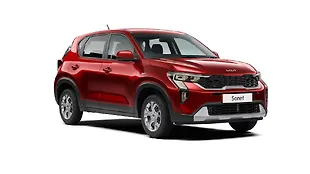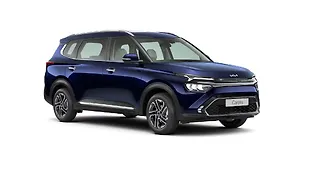Today’s choices
Premium SUVs have become the new flavour for those looking to upgrade to a bigger car or those coming in with a bigger budget while buying their first vehicle. The list of manufacturers in the game has expanded significantly over the last few years, and each offers its unique take on the body style.

But what if you want something a little more unique? Wel, say hello to the Skoda Kushaq Monte Carlo and Kia Seltos X Line. Both are premium versions of their respective standard cars with quite a bit more to offer. But why are we looking at them together? Because firstly, this is what you get in terms of choices in the market today; secondly, they are two approaches to the same concept - provide a specialised version of the standard car; and finally, both these cars fall in the same price bracket.
Muscle looks Vs Racing heritage

Up front, the grille is the signature on both cars and forms a central identity in both cases. Skoda’s butterfly grille is painted entirely black, while in the Kia, the Tiger nose grille is a more conventional and shiny chrome-laden version.

In profile, you can notice the 100mm edge in length that the Seltos has over the Kushaq but given their special nature, that’s not the only thing that will grab your attention. Both get black cladding on the sides, and where the Seltos get orange accents, the Kushaq benefits from a Monte Carlo badging on the side.

Both cars have intricate designs for the wheels, with the Kushaq picking up the styling from the Octavia RS and getting coloured brake callipers, while the Seltos X Line is the first car in the segment to offer 18-inch wheels.

The biggest highlight of the exterior design is, of course, the paint scheme. The Kia Seltos rocks a first-in-segment matte paint scheme and blacked-out chrome, while the Kushaq has been treated to a red and black colour scheme specific to the Monte Carlo trim level. If it's the attention you want, then these special editions have them in spades, and no matter which part of the car you look at, there is something that will catch your gaze.
Cabin talk

The cabin, across both cars, in terms of elements and layout, remains unchanged from the standard vehicle. In the Seltos, you now get leatherette upholstery in a lovely blue shade called Indigo Pera. It’s got the same seat pattern as the Tech Line version but in blue.

The Seltos’ front seats offer good amounts of space in all departments, but a tall person like me could have done with a bigger seat base for more under-thigh support. Space in the second row is no issue either. The middle occupant won’t have issues in terms of headroom and shoulder room but will be compromised in the legroom department due to the positioning of the rear AC vents.

Where the Seltos’s interior displays blue hues, the Kushaq with its red and black interiors is loud and wants to be noticed. The seats are dual-tone, while the dashboard, centre console and door all get red inserts. Even the digital cluster and ambient lighting are all red affairs to match the Monte Carlo badge. Because it is unchanged from the standard car, you get the same in terms of headroom and legroom in the first row. The second row is reasonably spacious, with enough room for two to sit in comfort. The seats are a little low on under-thigh support but offer decent levels of comfort.

The interior quality is better in the Seltos with lots of soft-touch plastics all around, while the cabin in Kushaq feels a segment down due to the plastic quality as well as the switches and buttons on the doors.
Feature list

Both cars are based on top-spec versions of the standard car, which in the case of the Kia is the GTX+ trim, while the Kushaq is based on the Style trim. This means all the bells and whistles that you can have with them.

The list is pretty extensive for both cars with features like climate control with rear AC vents, touchscreen infotainment system with wireless Apple CarPlay and Android Auto, ventilated front seats, steering mounted controls, power mirrors, power windows, auto-dimming IRVM, connected car technology and 360-degree parking camera.

You see the differences in minor details like, for example, the Seltos turns on the side cameras if you indicate and turn the steering wheel, allowing you to see into a turn. In the Kushaq, you get an easier-to-use infotainment system.

It also has a fully digital instrument compared to the Seltos that receives a colour MID between the two analogue dials. However, the Seltos’ steering-mounted buttons are easier to use than the Kushaq’s scroll wheels which can be confusing initially. However, this is more of a function of getting used to.
Performance and Drivability

The Kia Seltos in the X Line trim can be had with Kia’s 1.4-litre GDi turbo petrol that produces 138bhp/242Nm mated to a seven-speed DCT, while the diesel is the 1.5-litre unit that makes 113bhp/250Nm and is offered with a six-speed torque converter automatic.

The Kushaq Monte Carlo’s range is much higher, with the special treatment offered with both the 1.5-litre TSI petrol engine and the 1.0-litre TSI engine. The former is more powerful, with an output of 148bhp/250Nm and mated to a seven-speed DSG. The smaller 1.0-litre TSI unit produces 114bhp/178Nm and can be had with a six-speed manual or a six-speed torque-converter automatic.
Now given that the Kushaq is petrol and the Seltos, a diesel, it wouldn’t be fair to compare them, so here is what they are like to drive individually.

The Skoda Kushaq in this 1.5-litre DSG guise is the most potent version available. The numbers are impressive, and it certainly has the grunt. On the go, there’s lag below the 2000rpm mark, but once past, the engine comes into its own with a linear delivery providing strong cruising ability. The DSG does its best work if you let it do its thing in the background and give the numbers that this engine offers; you are never short of grunt.
If you need to up the pace, the engine does equally well, and in the S mode, the gearbox pushes all the way to the 6000rpm redline before shifting. In terms of NVH, this engine and gearbox combination is right up there with smooth and vibe-free idling. Even when you mash the throttle to build up speed, it shifts seamlessly and makes all the right noises as you push closer to the red line.

In our tests, the Kushaq Monte Carlo did the 0-60kmkph sprint in 4.88 seconds, while the 0-100kmph time was 9.68 seconds. Of this, the latter is indicative of the engine’s ability to rev quickly, smoothly and relentlessly. The steering weighs up nicely as you go faster and is very direct in its response, which pretty much falls in line with Skoda’s fun-to-drive image. You get confidence-inspiring turn-ins and room to make course corrections if needed. The body roll is well controlled, and the ride quality is firmer, but it’s pliant.

Kia Seltos
On the other side of the table is the Kia Seltos with a diesel engine. By their nature, diesel engines might not be quick in their response but never leave you short of motivation. As a car to drive, this diesel AT Seltos in city conditions feels easy to use with a light steering that’s a boon for low-speed manoeuvres. The diesel engine has enough grunt to make immediate overtakes if needed.

Out on the highway, you get some great cruising ability that can be achieved with the light right foot and keeping the revs below the 2000rpm mark. Equally impressive are the efficiency figures. In our real-world tests, this combination is 16.35kmpl city and 19.37kmpl highway. The equivalent manual did 15.23kmpl in city conditions and 18.14kmpl on the highway.

Despite having segment-first 18-inch wheels in the Xline trim, the ride is not uncomfortable and takes most of everything in its path without much of a struggle or unsettling the occupants. However, even with the 190mm ground clearance, you should tread cautiously over the really large potholes or speed breakers.
Conclusion

These are the choices you get in the market today if you are someone that’s into special editions or wants to stand out in a crowd. Both cars have more than enough to grab your attention without losing out on their essence. The Kia Seltos is a bit more subtle in its approach, while the Kushaq is louder and brighter despite being the smaller of the two in terms of dimensions.
Photography: Kapil Angane

![Kia Seltos [2022-2023] Image Kia Seltos [2022-2023] Image](https://imgd.aeplcdn.com/272x153/n/cw/ec/115501/seltos-exterior-right-front-three-quarter.jpeg?isig=0&q=80)

























